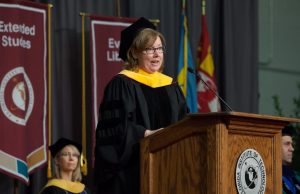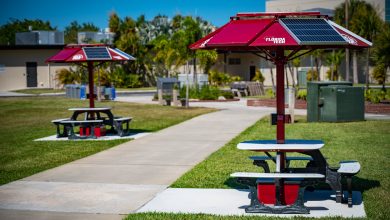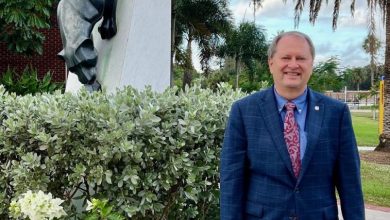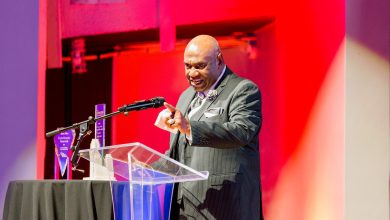Florida Tech Commencement Starts Next Chapter for Hundreds of Graduates
NASA Director Offered Wisdom:
Explore, Develop, Enable and Discover
MELBOURNE, FLA. — Florida Institute of Technology held its fall commencement Saturday, conferring more than 1,000 degrees overall and welcoming hundreds of students to the Charles and Ruth Clemente Center to receive their diplomas during two enthusiastic ceremonies.
The undergraduate ceremony in the morning featured 298 students. The afternoon graduate ceremony included 427 students.
Graduates hailed from 30 states – including 182 from Florida – and 60 countries. Saudi Arabia, China and India were among the countries with the highest representation. Those with a single graduate included Bosnia and Herzegovina, Cayman Islands, Georgia, Italy, Kenya, Norway and Slovenia.
Both ceremonies featured keynote addresses from Mary Beth Koelbl, director of the Propulsion Systems Department at NASA’s Marshall Space Flight Center since 2015. She spoke about four strategic goals at NASA that are captured by four words: Explore, Develop, Enable and Discover.
“Keep in mind, exploring takes a little risk, and not everything works out perfectly, but those risks often provide the best rewards, and end up being the highlight of your journey,” she told the graduates.
She spoke about the Mars Insight Rover which recently landed on that planet, and the data it will send back to Earth. “Maybe one of you will use that data someday in your career. Or maybe discovery for you will be related to cybersecurity or medicine or investment banking or education. Whatever path you take, challenge yourself to discover something unexpected. Who knows what that may be?”
(Koelbl’s full speech is reprinted below.)
Koelbl joined Marshall in 1986 as an aerospace engineer in the Turbomachinery and Combustion Devices Branch. In 2000, she was named deputy group leader of the Engine Systems Engineering Group, and in 2003 was named group leader. After a center-wide reorganization in 2005, she was named chief of the Engine and Main Propulsion Systems Branch. She was promoted to division chief of the Propulsion Systems Division, where she served until her appointment to the deputy director of the Propulsion Systems Department in 2011.
Florida Tech President Dwayne McCay – who before entering academia in 1986 served as a senior engineer, branch chief and division chief at Marshall Space Flight Center – offered opening remarks at both ceremonies.
He spoke about the university’s alumni and its ability to produce “job-ready” graduates who make their mark on their chosen field.
“That’s why we have nearly 400 alumni working at Boeing, more than 340 at NASA, more than 260 at IBM and yes, since we are in Florida, more than 100 at Walt Disney World. It’s why our alumni include five astronauts, the nation’s first female four-star general, the executive vice president of Johnson & Johnson, the president of Virgin Galactic and the director of aviation at the Port Authority of New York and New Jersey. And it’s why we are so proud to be adding to that illustrious list today,” he said.
###
Commencement address from Mary Beth Koelbl:
Dr. McCay; distinguished trustees; faculty; honored guests; friends and family who have made today possible … what a pleasure it is to be here on the Space Coast at Florida Tech sharing this tremendous day with you. I could not be more thrilled.
To the Class of 2018 — Congratulations! What an accomplishment, you should be proud of yourselves. I am honored and humbled to be here speaking to you on this momentous occasion of your graduation.
You are probably asking yourself why is she here, speaking at my commencement? She’s not from Florida, she didn’t go to school at Florida Tech, and she certainly isn’t famous. And although Florida Tech and NASA are forever intertwined because they were created together – both celebrating their 60th anniversaries this year — why of all the people at NASA did they ask HER to speak?? Believe me, I asked myself the same thing.
So how did I get here? It is kind of a funny story. Dr. McCay visited NASA’s Marshall Space Flight Center earlier this fall. He was interested in what was going on in propulsion and exploring areas for collaboration. So, as director of propulsion, I was asked to host him. We talked about the work NASA is doing and the great research going on at Florida Tech. A few days later I received an email that said “I want to have you as a commencement speaker and the next opportunity is December. Are you interested?” I read that email and thought, OH MY GOODNESS, what is he thinking??? My strength is NOT public speaking. So I carefully considered my response, how to politely tell him that I’m more comfortable in small groups. I replied, “I’m flattered, but I don’t see myself as a commencement speaker. Don’t you want me to come talk to a group of students instead? I am very passionate about developing people and in helping to encourage college students to dream big.” I was sure that was the perfect response to succeed in speaking to a smaller group of students. But instead I got a note back, “That is why I want you for commencement”. So here I am. He was right of course, I genuinely embrace Florida Tech’s core value of student success. So what advice can I offer you?
At NASA, we have four strategic goals, captured by four words: Explore, Develop, Enable and Discover. Lofty words for lofty goals, and we need lofty words because today we are challenged to do more with less. The scope of what NASA is doing today is much broader than 60 years ago. In science, we are working to understand our planet, our solar system, and beyond. In aeronautics, we are making air travel faster, quieter, and safer. We are focused on exploration beyond low earth orbit, with our sights on Mars; and on developing the technologies to accomplish all of these missions in a challenging fiscal environment. But we are successful because we are not going alone. We have the cooperation and support from commercial and international partners. Our partners are focused on missions to low earth orbit, allowing NASA to take those risks on the things we don’t yet know how to do. So we need those four lofty words to inspire us, and those four words can inspire you too today as you take the next step on your journey.
Explore. At NASA this means to extend our human presence deep into space. Although our Apollo missions blazed a path to the Moon, today we are challenged to reach new milestones by using the moon in a long-term, sustainable way to prepare us for the next giant leap – human missions to Mars. We are working on the Space Launch System, SLS, built to carry astronauts and cargo farther and faster and to deliver human-rated spacecraft, habitats and science missions to the Moon, Mars and beyond.
For you, explore might mean something a little more “down to earth”. I like to use the analogy of a vacation when I mentor. You want to be prepared for your vacation, pack your suitcase, and get your supplies ready. But don’t plan your vacation so rigidly that you miss out on some spectacular site, or an impromptu performance, or that fabulous restaurant that only the locals know about. The same is true with your career. Plan a little, pack your suitcase, but leave some flexibility to explore. Keep in mind, exploring takes risk, and not everything works out perfectly, but those risks often provide the best rewards, and end up being the highlight of your journey.
I took a risk when I came to NASA. I knew nothing about NASA, or Marshall Space Flight Center, or the state of Alabama. In fact, when I graduated I had plans to go to graduate school. I was in the middle the application process when a phone call came from NASA offering me a job. I took a risk. I decided to explore. It sure wasn’t in my plans, but it ended up to be the best decision I have ever made because I ended up in a career that I love. There have been numerous times in my career that I have taken similar risks, and truthfully not all have worked out, but every time I was glad that I took the risk and explored the path. I am better today because of the experience. So I suggest to you that you already have your suitcase packed. It is filled with all the essentials – all that knowledge you have gained over the last 20 years — and today a diploma. You are prepared for the journey. Now is the time for you to go out and explore, but don’t be afraid to take a risk on an unplanned path. You will be glad you did. It may be life changing.
Develop. At NASA, develop is focused on those technologies of tomorrow. Those things we will need in the future to do the challenging things asked of us. We are also challenged to share those things that we develop broadly. Yet we need to be fiscally smart about the technologies we develop; they should be focused on enabling a mission. For you, I suggest “develop” is more personal. Although you have your diploma, you are not finished with your learning. Your career is a lifelong journey of learning. But one key to success is training only you can identify. Learn to be self-aware. Reflect on your skills, both career related and interpersonal. What are your strengths? And what are your weaknesses? Be honest with yourself and really contemplate what comes easily to you and what do you have to work harder on. And then find a mentor, or two, someone you trust, who cares about your career, and ask for candid feedback.
When those I mentor ask me for advice on applying for a particular job, I tell them to write down the skills needed for that job. If most of the skills needed are things they are good at doing, then it is a good job for them. For me, one of my strengths is being able to connect with people, I really enjoy working with others. I like to see the big picture of where my work fits in. So over the course of my career I have sought out job assignments that utilize these strengths – group projects, integration roles, and cross organizational collaborations. These assignments really give me energy and, if your work energizes you, you produce better products. When making decisions about where you work and jobs you accept, think about your strengths and find roles that utilize them.
Along with finding a job that utilizes your strengths, it is very important to work on your weaknesses; especially those that interfere with your ability to do your job. One day, they may be the reason you don’t advance. Because you may think you are good at hiding them, but everyone else knows what they are. We learned that lesson the hard way at NASA. Before the Columbia accident, we knew that there was a weakness in external tank insulation, and that the foam was coming off the tank each flight. We ignored this weakness, because no one believed it was a big deal. Until it was a big deal and it cost astronauts their lives. Obviously, I’m not implying your weaknesses will have that kind of an impact, but I am saying that it is worthwhile to work on your weaknesses because one day they will hold you back. They don’t get fixed overnight, it is a journey.
Enable. At NASA, when we talk about enable, we are focused on the capabilities, workforce, and facilities that allow NASA to achieve its Mission. We cannot be successful with just technical experts, we need specialists in human resources, procurement, law, accounting, and many other disciplines to enable our missions. It takes a village to launch a rocket or send a spacecraft to Mars. Those missions don’t happen if any part of the team is not functioning well.
In college, your focus is often on individual achievement. How you personally did on that test, or writing that paper, or making that presentation. Your grades are a reflection of YOUR effort. But when you begin your career, successes are very rarely about individual achievements. Very few jobs are only about what you personally do each day. You’ll need to pivot from an individual focus to a team focus. Some people have a very hard time with this. They spend their career trying to prove that they are the smartest person on the team, or the only one that can solve the problem. They fail to recognize the contributions of others and more importantly they fail to understand that you can accomplish more through a highly functioning team. Don’t make this mistake. Learn to achieve not only through your own effort but also through the effort of others. If you learn how to help a team function well, you will go far in your career.
At NASA, our teams are often multidiscipline. There are engineers who write requirements, who design hardware to meet the requirements, who choose materials, who provide the environment, and finally the stress analysts, the poor souls tasked with the final calculations that determine if the hardware will fail or survive. Since they are last, there is typically immense schedule pressure to finish. On a well-functioning team, team members understand the stress analyst’s perspective and make compromises in their disciplines to maximize the chance of favorable results. Consider the opposite, a team member who has not made the transition from solo performer. Such as a designer that spent two extra weeks perfecting his design, removing material to make sure the hardware didn’t weigh too much. In the short term, he may look like a hero, earning accolades from his fellow designers for such an elegant design and the project manager for meeting the weight requirement. Yet in the end, the team will fail because of his tardiness and his failure to consider the stress analyst’s perspective. Don’t be that guy, the selfish designer. No one wants him on their team.
Discover. For NASA, this is all about expanding knowledge through scientific discovery. And we are doing that today through the Mars Insight Lander that just a few weeks ago touched down and is beginning to send us photos back from Mars. The data it will collect over the next two years will give scientists better insight into the formation of Mars, Earth and other similar planets. Maybe one of you will someday use this data in your career. Or maybe discovery for you will be related to cybersecurity or medicine or investment banking or education. Whatever path you take, challenge yourself to discover something unexpected. Who knows what that may be?
Discovery requires curiosity, determination, and interest in something unknown. When I grew up, the internet did not exist. Or cell phones. Or streaming television. Or pay at the pump. All of these things have been “discovered” during my career by individuals who were curious and pursued a new idea. Who knew in advance that we would need these things? But now, who can live without them? What will be discovered during your career? It is up to you. Don’t be satisfied with how things have always been, there are always ways to make things better. But be curious and pursue a novel idea or an innovative process.
Remember, your discovery doesn’t have to be an invention; it may be quite personal, you may discover something about yourself. That is what discovery was for me. The first half of my career was quite technical, I had no other goal than to excel at my job as a turbomachinery engineer at NASA. But one day, a friend made an unexpected suggestion. I was curious. I thought it over, asked questions, and challenged the status quo of my career goals and my career took an unexpected but very rewarding turn into managing people. I discovered something that I had not known before and the second half of my career has been even more rewarding than the first, because I took a chance, challenged my career status quo, and discovered my true passion. I challenge you to always be curious, challenge your status quo, and who knows what you will discover!
So as you move forward on the next step of your journey, remember the words that underpin NASA’s strategy: Explore, Develop, Enable, and Discover. These words can provide strategy for your success as well. So Explore, be prepared yet flexible and willing to take a risk. Develop, find a role that utilizes your strengths while you work on your weaknesses. Enable, by transitioning from individual to team success. And Discover by being curious and challenging the status quo. If you embrace these lofty words, you will reach lofty goals in your career. And finally, I leave you with a quote from Astronaut Sunita Williams, a Florida Tech graduate, that I believe best expresses your potential, “Don’t get bogged down by limits, there aren’t any!”
Thank you and Go Panthers.






